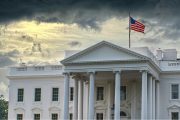
Several Capitol Hill news agencies are reporting that President Donald Trump is considering issuing an executive order ending so-called birthright citizenship for children born to those present in the country without federal approval.
While the president has neither confirmed nor denied that such an order is in the offing, since his days as a candidate in 2016, President Trump has committed to amending the federal regulations governing birthright citizenship. To date, no significant steps have been taken toward that end during the Trump administration.
For years, the halls of Congress have resounded with calls from several key GOP legislators for hearings into the 14th Amendment’s supposed grant of citizenship to children born in the United States whose parents are illegal aliens. The subject of whether citizenship is a condition of the location of birth of the inelegantly nicknamed “anchor babies” is seen as a crucial battle in the wider war against the invasion of the United States by millions of illegal aliens.
The anchor in “anchor babies” refers to the purported ability of children born in the United States to illegal immigrant parents to sponsor those parents in their request for permanent residency here. According to the argument, as citizens of the United States, those children have the right to sponsor the immigration efforts of family members seeking legal immigration status.
The lawful ability of American citizens to serve as sponsors to would-be immigrants is not in question. What is in question, however, is whether children born within the sovereign borders of the United States should be endowed with the full panoply of privileges and immunities of which citizens are possessed. This is the crux of the current controversy.
The principal argument advanced by those who oppose the instant and irrevocable bestowal of citizenship upon the children of those illegally living or working in the United States is that the U.S. Constitution does not grant citizenship at birth to a child simply because he was born within the borders of the United States. Those advocating this interpretation of the 14th Amendment insist that it is the allegiance (complete jurisdiction) of the child’s parents at the time of birth that governs the issue of the child’s citizenship, not his geographical location at the time of birth.
One need only look to the legislative history of the passage of the 14th Amendment to discover the original intent of the framers of that law.
During the vituperative debates that embroiled the Senate in those historic days following the Civil War, Senator Howard insisted that the qualifying phrase “subject to the jurisdiction thereof” be inserted into Section 1 of the 14th Amendment being considered by his colleagues. In the speech with which he proposed the alteration, Howard declared:
This amendment which I have offered is simply declaratory of what I regard as the law of the land already, that every person born within the limits of the United States, and subject to their jurisdiction, is by virtue of natural law and national law a citizen of the United States. This will not, of course, include persons born in the United States who are foreigners, aliens, [or] who belong to the families of ambassadors or foreign ministers accredited to the Government of the United States, but will include every other class of persons.
How could a person “born in the United States” be simultaneously a citizen and a “foreigner” or “alien” if the mere fact of nativity settled the question of citizenship?
Any reading of the plain language of the statute coupled with the pertinent legislative commentary reveals that a child born to persons illegally present in the United States cannot be thought to benefit from the boon of citizenship when their parents are by very definition aliens to the “extent and quality” of that most desirable status. Can the fountain of liberty send forth the sweet water of citizenship at the same place as the bitter water of unlawful entry?
The explications of the legislators from whose pens flowed the “citizenship clause” and whose voices sounded in approval thereof serve to disarm the proponents of citizenship for anchor babies. The Supreme Court haughtily has disregarded the declared intent of the framers of the 14th Amendment and misconstrued the keystone “subject to the jurisdiction thereof” clause, thereby creating a right and a class of citizens by judicial fiat. The notion of the Constitution as a document of specified and limited enumerated powers is foreign to the court and has been for over a century.
Rather than to the serendipity of birthplace alone, citizenship rightly defined depends upon the undivided and lawful allegiance of the child’s parents. May a child legally inherit property from his parents that his parents do not own? While that child indisputably may work and attain that property by his own effort, his parents may not bequeath such to him, for it is not lawfully within their power to dispose.
Finally, let’s look to the very source of the constitutional standard of citizenship known to us today. The Swiss jurist Emer de Vattel defined that term in his seminal book The Law of Nations, published in 1758 and which, according to Benjamin Franklin, “had been continually in the hands of the members of our Congress.”
Book I, Chapter 19, Section 212 of The Law of Nations reads:
Natural-born citizens, are those born in the country, of parents who are citizens. As the society cannot exist and perpetuate itself otherwise than by the children of the citizens, those children naturally follow the condition of their fathers, and succeed to all their rights. The society is supposed to desire this, in consequence of what it owes to its own preservation; and it is presumed, as matter of course, that each citizen, on entering into society, reserves to his children the right of becoming members of it. The country of the fathers is therefore that of the children; and these become true citizens merely by their tacit consent. We shall soon see, whether, on their coming to the years of discretion, they may renounce their right, and what they owe to the society in which they were born. I say, that, in order to be of the country, it is necessary that a person be born of a father who is a citizen; for if he is born there of a foreigner, it will be only the place of his birth, and not his country. [Emphasis added.]
For the last word we turn to a man whose opinion is widely considered the first word on the Constitution — James Madison:
When we are considering the advantages that may result from an easy mode of naturalization, we ought also to consider the cautions necessary to guard against abuse. It is no doubt very desirable that we should hold out as many inducements as possible for the worthy part of mankind to come and settle amongst us, and throw their fortunes into a common lot with ours. But why is this desirable? Not merely to swell the catalogue of people. No, sir; it is to increase the wealth and strength of the community; and those who acquire the rights of citizenship, without adding to the strength or wealth of the community are not the people we are in want of.




